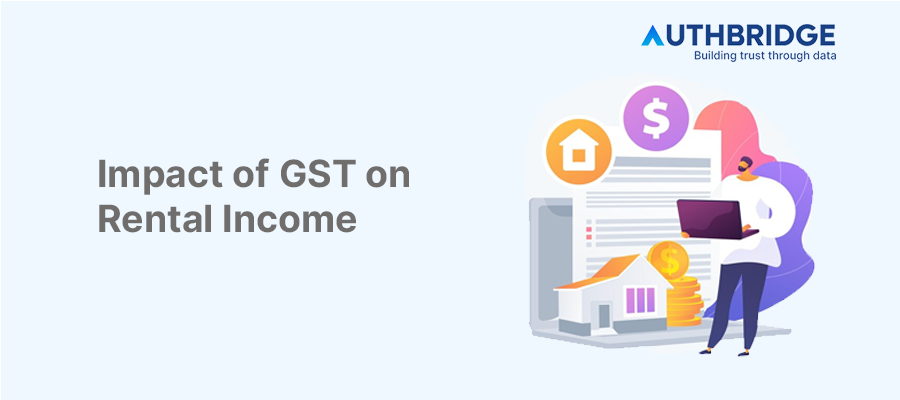Decoding The Impact Of GST On Rental Income

The introduction of the Goods and Services Tax (GST) in July 2017 marked a significant shift in India's tax regime, including how rental income is taxed. This comprehensive change aimed to streamline tax compliance and eliminate the cascading effect of taxes, but it also introduced new considerations for landlords and tenants. This blog explores the journey of rental income taxation from the pre-GST era to the current GST framework, highlighting the impact, nuances, and compliance requirements under both regimes.
The Pre-GST Landscape: Service Tax on Rental Income
Before GST, the taxation of rental income was primarily governed by the service tax, a regime that had its own set of rules and exemptions. Let's delve deeper:
- Service Tax Threshold and Applicability: Landlords were obligated to register for service tax if their annual taxable services, including rental income, exceeded Rs. 10 lakh. This threshold provided a buffer for small property owners, exempting them from service tax unless their rental income was substantial. Commercial properties bore the brunt of service tax, with a rate of 15%, whereas residential properties used for dwelling purposes were spared, promoting affordable housing.
- Exemptions and Limitations: The exemption of residential properties from service tax was a relief to many. However, this exemption did not extend to residential properties used for commercial purposes, a nuance that required landlords to be diligent about their property's use and corresponding tax implications.
Transitioning to GST: A New Paradigm for Rental Income
The advent of GST brought about uniformity and clarity but also necessitated a recalibration of how rental income is taxed. Here are the pivotal changes and their implications:
- Broadened Scope of Taxability: Under GST, renting of immovable property is categorized as a supply of services. This broad definition ensures that almost all forms of leasing or renting, barring certain exemptions, come under the tax ambit. The standard rate for these services is set at 18%, which is a significant consideration for commercial property rentals.
- Residential Rentals and GST: A notable exemption under GST is for residential properties rented for dwelling purposes. This exemption mirrors the pre-GST era's approach but extends clarity and relief to tenants and landlords alike. The 48th GST Council meeting further clarified that residential dwellings rented for personal residence by registered persons would also be exempt, ensuring that GST does not burden individual tenants.
- Impact on Commercial Rentals: Commercial properties, including office spaces, shops, and industrial units, are subject to GST at 18%. This inclusion underscores the government's intent to tax business-related activities uniformly. Landlords renting out commercial spaces must now navigate GST registration, invoicing, and compliance.
Compliance and Implications for Landlords and Tenants
The GST regime mandates landlords with a rental income exceeding Rs. 20 lakh to register and comply with GST requirements. This threshold is a significant increase from the pre-GST era, offering relief to small property owners. However, it also imposes a compliance burden on those with higher rental incomes or multiple properties.
- Input Tax Credit (ITC): One of the advantages under GST is the availability of ITC for tenants paying GST on commercial rentals. This provision allows businesses to offset their GST liabilities against the tax paid on inputs, including rent, which can lead to substantial savings and lower operational costs.
- Tax Deduction at Source (TDS): The GST framework does not alter the Income Tax Act's provisions regarding TDS on rental income. Landlords earning more than Rs. 2.4 lakh annually from a property must still comply with TDS requirements, ensuring that tax considerations remain multi-faceted.
Navigating GST Registration and Place of Supply
The place of supply rules under GST plays a crucial role in determining whether CGST and SGST or IGST applies to a rental transaction. These rules ensure that tax revenues accrue to the correct state, particularly in inter-state leasing scenarios. Landlords and tenants must understand these provisions to ensure accurate tax payments and compliance.
- Inter-State and Intra-State Rentals: The GST on rent depends on the location of the property and the registration of the parties involved. Inter-state rentals attract IGST, while intra-state transactions are subject to CGST and SGST, affecting how landlords invoice their tenants and how tenants claim ITC.
Conclusion: Adapting to the GST Framework for Rental Income
The transition from service tax to GST for rental income has been transformative, introducing both challenges and opportunities for landlords and tenants. By understanding the nuances of GST applicability, exemptions, and compliance requirements, stakeholders can navigate this landscape more effectively. With the right knowledge and approach, the real estate sector can adapt to the GST era, ensuring transparency, compliance, and optimized tax liabilities.
Meta- GST's impact on rental income and what landlords need to know
Category

Abhinandan Banerjee
(Associate Manager - Marketing)
Abhinandan is a dynamic Product and Content Marketer, boasting over seven years of experience in crafting impactful marketing strategies across diverse environments. Known for his strategic insights, he propels digital growth and boosts brand visibility by transforming complex ideas into compelling content that inspires action.



